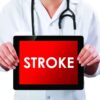![1]()
News
Infections up the risk for pregnancy-associated stroke in preeclampsia
May 25, 2017
A study in a diverse population of pregnant women with preeclampsia has identified several risk factors for pregnancy-associated stroke.
![1]()
News
Assessment of goals of care in nursing home reduces hospitalization for patients with dementia
May 5, 2017
For patients with advanced dementia, does a goals-of-care intervention improve communication and care outcomes?
![1]()
News
Assessment of goals of care in nursing home reduces hospitalization for patients with dementia
March 22, 2017
CLINICAL QUESTION: For patients with advanced dementia, does a goals-of-care intervention improve communication and care outcomes?
News
Recent increase in subdural hematoma may be linked to antithrombotics
February 28, 2017
Has the more widespread use of antithrombotic medication resulted in more cases of subdural hemotoma?
![1]()
News
Acute HIV Causes Transient Neurologic Findings
October 1, 2016
How common are neurologic findings in acute HIV infection?
![1]()
News
Warfarin Reduces Risk of Ischemic Stroke in High-Risk Patients
August 29, 2016
What are the risks and benefits of warfarin or antiplatelet drugs compared with no antithrombotic therapy in patients with a previous intracranial hemorrhage?
![1]()
News
Hospital Admission, Stroke Clinic Follow-up Improve Outcomes for Patients with Transient Ischemic Attack, Minor Ischemic Stroke
June 20, 2016
Clinical question: How do guideline-based care and outcomes of patients with transient ischemic attack (TIA) and minor ischemic stroke differ among patients admitted to the hospital and discharged from the ED, as well as in those referred versus not referred to stroke prevention clinics following di
News
Stent Retriever Therapy Added to tPA Effective for Treating Acute Ischemic Stroke
June 3, 2016
Clinical question: Does the use of stent retrievers in conjunction with tissue plasminogen activator improve outcomes in patients with acute ischemic stroke? Bottom line: The use of stent retriever devices in addition to tissue plasminogen activator (tPA) in patients with anterior circulation acu
News
Helicobacter Pylori Treatment is Associated with a Short-term Increase in the Risk of Neuropsychiatic Events
May 9, 2016
NEW YORK (Reuters Health) - Helicobacter pylori treatment containing clarithromycin is associated with a short-term increase in the risk of neuropsychiatric events, according to a study from Hong Kong. Neuropsychiatric events following clarithromycin therapy have been reported previously, but no
News
Study Finds: Blood Pressure Medication and Stain Cholesterol Fighter Decreases the Risk of Heart Attack and Stroke in Patients with Hypertension and Moderate Risk of Heart Disease
April 13, 2016
(Reuters) - Patients with hypertension and moderate risk of heart disease slashed their long-term risk of heart attack and stroke 40 percent by taking a blood pressure medication as well as a statin cholesterol fighter, according to a large global study that could change medical practice. Results




